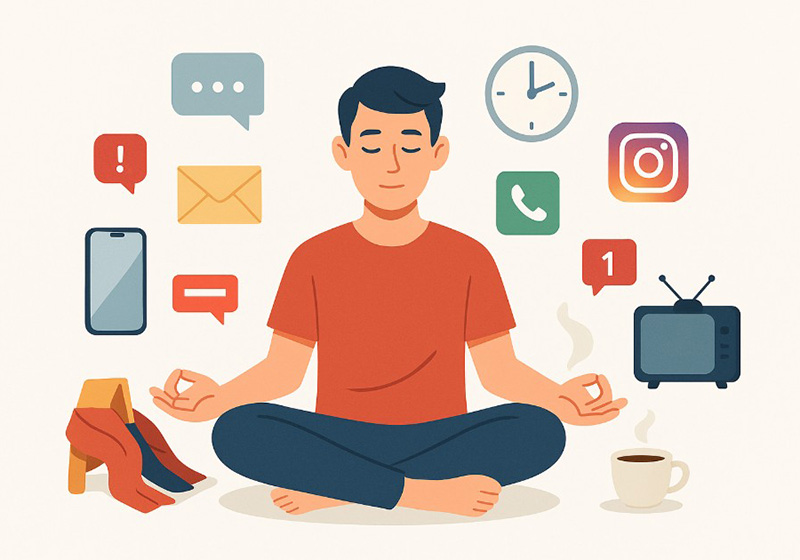Table of Contents
Concentrate! How to keep your focus and avoid distractions
Focus is not only essential if you are to reach your personal and professional goals, it also connects you with the outside world and with other people, fostering interpersonal relationships and a full, authentic experience of everything around you.
Although attention is a limited and highly precious resource, we often struggle to maintain it as our digital tools and our surroundings bombard us with hundreds of external stimuli every day. Driven by a feeling of urgency or uncertainty, or seeking the instant gratification offered by social media platforms, we interrupt whatever we were doing – no matter how important – to check our WhatsApp chats or emails.
Training ourselves to select and filter external stimuli has become an essential skill to protect our mental wellbeing, creativity and personal relationships. But in a world that is increasingly overloaded with information, where apps and social networks are intentionally designed to grab our interest and get us addicted, how can we maintain and optimise our focus?
It’s not entirely our fault
According to Statista, the amount of data created, captured, copied and consumed globally increased from 2 zettabytes in 2010 to 149 zettabytes in 2024. This is projected to increase to 181 zettabytes by the end of 2025; a 9050% increase in the volume of data over the last 15 years.
As well as the expansion of the internet, the pervasive nature of social platforms and AI’s numerous applications, businesses and media outlets are also ruthlessly vying for users’ interest on a daily basis. In a fascinating article, the writer and marketing consultant Annamaria Testa describes the current media panorama as an attention market, where the push for ever-greater profit is driving newspapers, online periodicals and TV channels not just to ensure their survival, but to greatly expand their income.
So how can we filter out external stimuli to avoid mental overload and to maintain our focus on whatever it is we’re doing, in a digital ecosystem where content production is completely unregulated and it is in the interests of the various players involved to keep people on the web for as long as possible? We’ve gathered together some suggestions from books and international research, to help you maintain your focus and use it to achieve your goals.

Some strategies for better focus
The attention economy, a theory first formulated in the 1970s by economist Herbert A. Simon and subsequently developed by other scholars, describes how people’s attention is a precious and highly limited resource for which various players – newspapers, TV and streaming platforms and businesses seeking to advertise their products or services – are all competing. If an individual is not focusing fully on a certain activity, their attention can be exploited by others to achieve their goals.
With that in mind, let’s look at how you can learn to manage it effectively.
1.Reduce stimuli and avoid multitasking
In her book Attention Span: A Groundbreaking Way to Restore Balance, Happiness and Productivity, the psychologist Gloria Mark revealed some surprising results from her research on the influence on technology on our focus. On average, over the past 20 years, the time people spend on a single computer or smartphone screen before moving to another one has fallen from 2.5 minutes to 47 seconds.
And these interruptions come at a heavy cost. According to Mark, it takes an average of 25 minutes to get back to your original activity after stopping it. When your attention is interrupted, the new object you are focusing on also interferes with your memory encoding – the way your brain stores information, which requires a certain amount of active engagement with an object to transfer the data from your short-term to your long-term memory. If you are distracted by other things in the meantime, your learning suffers.
It is therefore essential to remove any distractions – and particularly smartphones and other digital devices –from your environment, so you are not tempted to check your notifications, and to break the well-known social media-induced dopamine cycle.

2.Take breaks
When you feel your attention levels falling, stopping what you are doing for a few minutes, even if only to stretch your legs and make a coffee, can help you to rapidly regain your concentration. The important thing here is to limit these breaks to times when you really need to release some mental tension, and so return to an optimal level of focus.
A recent study published in the Journal of Applied Psychology showed that workers who incorporate regular short breaks (1–3 minutes) into their routines increased their productivity by 28% and reduced operational errors by 23%.
3.Change your environment or go for a walk
When you start to lose concentration or there are too many distractions around, changing room can be the key to maintaining a good level of focus. This is a useful trick not only for people who work in noisy open spaces, but also those looking for inspiration or creative solutions: moving to a new environment can help you break the monotony, abandon entrenched ways of thinking and come up with innovative ideas.
If you have the chance, going for a stroll outdoors can help you to rediscover your creativity and stimulate your imagination: various pieces of research have highlighted how walking promotes ‘divergent thinking’, a mindset that encourages you to come up with original and effective solutions to a certain issue or situation.

4.Understand why you tend to get distracted
As always, awareness is the first step to understanding and solving a problem. There are various reasons why your level of focus may be low, such as a lack of motivation to carry out a certain task, tiredness, excessive external stimuli or boredom. And there’s more: Nir Eyal, author of the book Indistractible: How to Control Your Attention and Choose Your Life explains people tend to use apps and mobiles to mitigate certain psychological states, such as loneliness, insecurity or sadness. Identifying the cause of your distraction is the first step to taking back control of your attention and focusing it on the things that will really help you to reach your goals, whatever they may be.
5.Go for flow
In his book Stolen Focus: Why You Can’t Pay Attention – and How to Think Deeply Again”, the author Johann Hari illustrates several ways of getting your focus back. One of these is intentionally looking for a flow state: a mental state of deep concentration where you are so immersed in an activity you lose track of time and your own self.
Recalling Mihály Csíkszentmihályi‘s flow theory, Hari notes that to achieve flow you need to concentrate on a single goal that reflects your values and interests and puts your skills to the test, but which equally does not seem unachievable. If you find the right conditions for entering this state of mind, you can fight the negative effects of digital tools and multitasking, improve your productivity and creativity and experience a deep sense of joy and satisfaction.
All these tricks can help you to increase your focus and concentration in your everyday lives, both at work and at leisure, and to connect more intimately with the outside world. They can be combined with personal strategies, guided by knowledge of your own rhythms or the factors that hinder your concentration. For example, you could plan to carry out your most demanding activities at the times you normally feel most productive, and reduce interruptions to a minimum during these periods. Gradually, you’ll discover how freeing your attention from unwanted external stimuli can give you new mental energy, and improve your creativity and productivity and your relationship with the universe around you.

